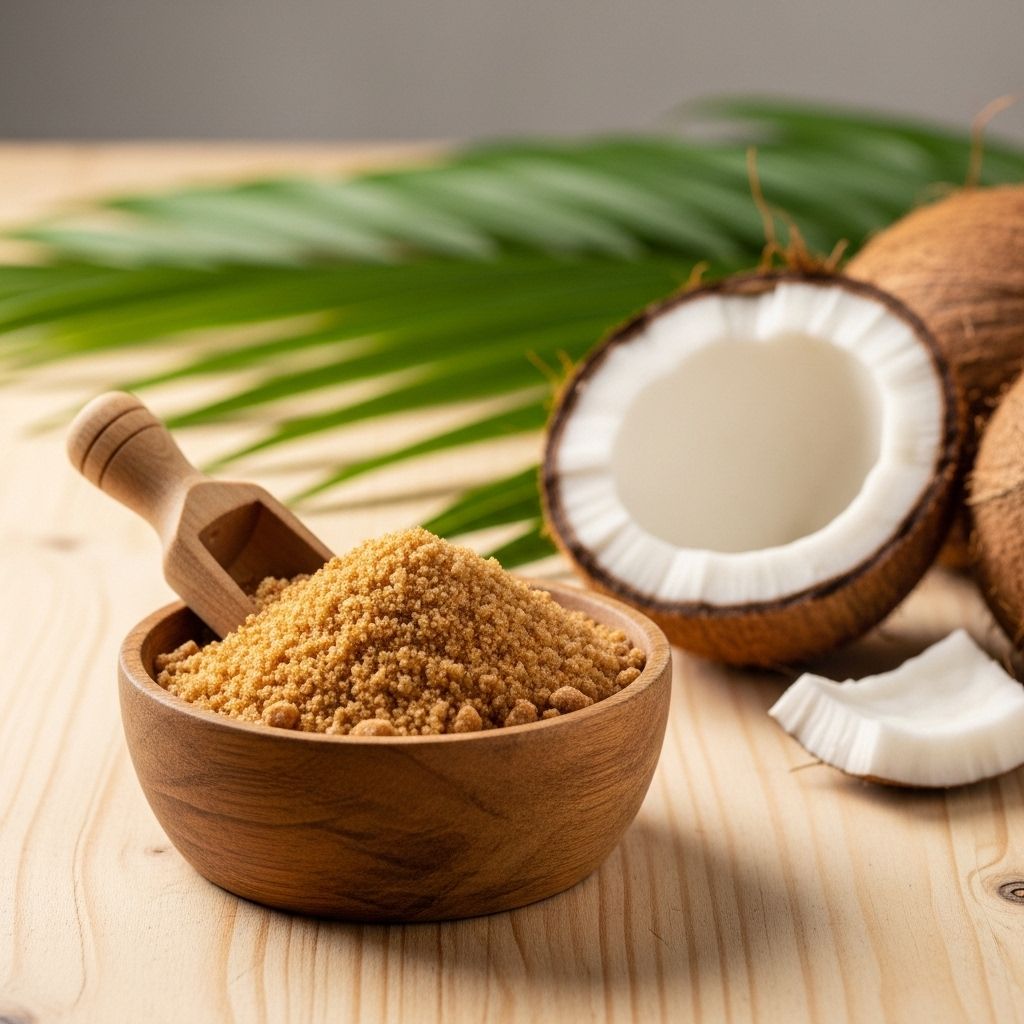Coconut Sugar: Benefits, Uses, and Taste – A Complete Guide to Coconut Palm Sweetener
Discover the natural sweetness of coconut sugar and its health benefits, culinary uses, and unique caramel flavor.

Table of Contents
- What Is Coconut Sugar?
- How Is Coconut Sugar Made?
- Coconut Sugar vs. Other Sugars
- Nutritional Profile
- Health Benefits
- Culinary Uses
- Taste and Appearance
- Where to Buy Coconut Sugar
- Sustainability and Ethics
- Frequently Asked Questions (FAQs)
What Is Coconut Sugar?
Coconut sugar, also known as coconut palm sugar, coco sugar, or coconut blossom sugar, is a natural sweetener derived from the sap of the flower buds of the coconut palm (Cocos nucifera). Unlike maple syrup or agave nectar, it does not come from the fruit—instead, the sap is collected from the “spadix” (the flower bud stem), then reduced by evaporation to form crystals, granules, blocks, or a thick liquid syrup.
Coconut sugar is primarily used in Southeast Asian cuisines but has gained global popularity as an alternative to traditional cane sugar due to its unique flavor and perceived health benefits.
How Is Coconut Sugar Made?
The production of coconut sugar is a traditional, labor-intensive process that remains largely artisanal. Here’s how it’s typically made:
- Tapping: Farmers climb coconut palms and make careful incisions into the unopened flower buds (spadix) to collect the sap, which flows into bamboo or plastic containers over several hours.
- Collection: Sap—milky and watery at first—is collected twice daily from each inflorescence, yielding about 1.5 liters per day.
- Evaporation: The sap is transferred to large open pans or woks and heated over moderate heat. Continuous stirring prevents burning as water evaporates, gradually thickening the sap into a syrup.
- Crystallization: The caramel-colored syrup is either poured into molds to form blocks or further reduced and crystallized into granules or powder.
- Packaging: The cooled sugar is sifted, sometimes hand-selected, and packaged for sale.
The natural brown color and caramel taste come from caramelization during the heating process. The entire process is sustainable, supporting small-scale farmers in regions like Indonesia and the Philippines.
Coconut Sugar vs. Other Sugars
Coconut sugar is often compared to cane sugar, brown sugar, and other palm sugars. Here’s how it stacks up:
| Sweetener | Source | Processing | Glycemic Index (GI) | Nutritional Notes |
|---|---|---|---|---|
| Coconut Sugar | Coconut palm sap | Minimal (heat evaporation) | 35 | Contains some minerals, inulin (prebiotic fiber), antioxidants |
| Cane Sugar | Sugarcane juice | Highly refined | 60 | “Empty calories”; stripped of most nutrients |
| Brown Sugar | Cane sugar + molasses | Refined, then molasses added | 65 | Slightly more minerals than white sugar, but still highly processed |
| Date Sugar | Ground dates | Dehydrated, ground | ~45 | Contains fiber and minerals from whole fruit |
| Maple Syrup | Maple tree sap | Evaporated | 54 | Contains some antioxidants and minerals |
Coconut sugar’s lower GI is attributed to its inulin content, a type of fiber that slows glucose absorption. However, it should still be consumed in moderation as part of a balanced diet.
Nutritional Profile
Coconut sugar is not a significant source of macronutrients, but it does retain some micronutrients from the sap, including:
- Minerals: Iron, zinc, calcium, potassium, and magnesium
- Antioxidants: Polyphenols and phytonutrients from the coconut palm
- Prebiotic Fiber: Inulin, which supports gut health
Despite these, the amounts are modest, and coconut sugar should not be considered a primary source of these nutrients.
Health Benefits
Coconut sugar offers several potential health advantages over conventional sweeteners:
- Lower Glycemic Index: With a GI of about 35, coconut sugar causes a slower, more gradual rise in blood sugar compared to cane sugar (GI 60).
- Contains Inulin: This dietary fiber acts as a prebiotic, supporting healthy gut bacteria and potentially aiding digestion.
- Trace Minerals: Offers small amounts of essential minerals, which are absent in refined sugars.
- No Additives: Pure coconut sugar is minimally processed and contains no artificial additives or preservatives.
However, coconut sugar is still a type of sugar and high in calories, so moderation is key. It is not a “health food” but can be a slightly better choice than refined sugars for those seeking a natural alternative.
Culinary Uses
Coconut sugar is a versatile sweetener with culinary applications similar to brown sugar and cane sugar. Here are some ways to use it:
- Baking: Substitute 1:1 for cane sugar in cookies, cakes, muffins, and bread.
- Beverages: Sweeten coffee, tea, smoothies, and cocktails with its caramel notes.
- Sauces & Marinades: Add depth to barbecue sauces, glazes, and marinades.
- Desserts: Use in custards, puddings, and fruit compotes.
- Breakfast: Sprinkle on oatmeal, yogurt, or granola.
Its granular texture makes it easy to measure and use, while its subtle molasses flavor enhances both sweet and savory dishes.
Taste and Appearance
Coconut sugar resembles brown sugar in appearance, with granules that can range from light to dark brown depending on the degree of caramelization. The taste is pleasantly caramel-like, with a hint of butterscotch—richer and less sweet than cane sugar, but without a pronounced coconut flavor.
The color and flavor come naturally from the caramelization of sugars in the sap during evaporation, not from added molasses or coloring. Its taste and texture make it an easy swap for brown sugar in most recipes.
Where to Buy Coconut Sugar
Coconut sugar is widely available in health food stores, supermarkets, and online retailers. Look for organic, fair-trade options to support sustainable and ethical production practices. It usually comes in fine granules, but you may also find blocks or liquid syrups in specialty stores.
Sustainability and Ethics
Coconut sugar production supports rural communities in Indonesia, the Philippines, and other tropical regions, providing livelihoods for small-scale farmers. The
References
- https://en.wikipedia.org/wiki/Coconut_sugar
- https://www.thecoconutcompany.co/blogarchive/2023/7/12/how-are-coconut-sugar-and-coconut-nectar-made
- https://www.thecoconutcompany.co/blogarchive/2020/5/30/all-there-is-to-know-about-coconut-sugar
- https://pmc.ncbi.nlm.nih.gov/articles/PMC9964017/
- https://www.healthline.com/nutrition/coconut-sugar
Read full bio of Sneha Tete












